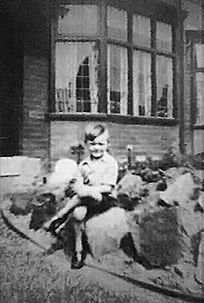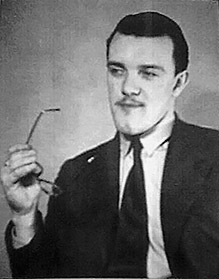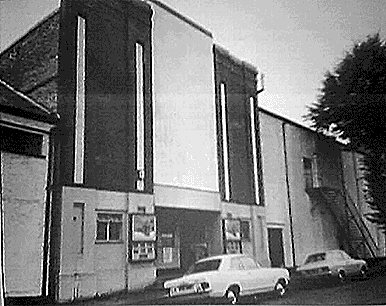 |
|
Robert James Leslie Halliwell was born in Bolton, Lancashire on February 23rd, 1929. On his first visit to a cinema he had to be carried out screaming but unfortunately neither he nor his family could remember the title of the movie which provoked this outburst. His first remembered trip to the cinema came in 1933, at the age of four, when his Mother took him to see Sylvia Sidney in a non-singing version of Madame Butterfly at the Queen’s Cinema in his hometown –
|

|
Needless to say from this moment on Halliwell was hooked and throughout the 1930s made the cinema his home from home. At the time there were an astonishing forty-seven picture houses within easy reach of where he lived, twenty-eight of which were in the actual borough of Bolton, and out of these he only failed to visit one, The Gem. His Mother was happy to accompany him in the early days as she and his father shared few common interests, and so the two of them would marvel at the exploits of stars like Ronald Colman, Greta Garbo, Clark Gable, Fred Astaire and Claudette Colbert, in magical Hollywood adventures such as Lost Horizon and The Prisoner of Zenda, glittering musicals like 42nd Street and Top Hat, and delightful Hitchcock mysteries The Thirty-Nine Steps and The Lady Vanishes. |
|
|
|
A
life through film |
| In 1939 Halliwell won a scholarship to attend Bolton Public School but once there struggled to fit in. He hated sports; his exam results began to decline and with the added privations brought on by the outbreak of war, he turned more and more to the cinema for comfort and escape. He researched the history and techniques of film production in the Central Library, started to cast a more critical eye on the movies he saw and introduced a system of recording his movie experiences in notebooks. His use of one page for each programme – which might include a couple of short films, a ‘B’ picture and a main attraction – meant that space for comments was at a premium. As a result it was here he developed his talent for brief critiques of movies, which, four decades later, would make Halliwell’s Film Guide famous.
|
|
Things started to pick up for him the further he advanced at school and by the fifth form he was regularly involved in the school film society, which had great success with a showing of D. W. Griffith’s epoch-making silent The Birth of a Nation. He was also acting at an amateur theatre club, assisting in the production of school plays and even writing his own, one of which, Make Your Own Bed, was actually performed at the Hippodrome some years later. He also started writing letters about films to various publications and was paid five shillings for a poem about horror films printed by Picturegoer magazine, his movie-going bible at the time. He also wrote to the Bolton Evening News to suggest the foundation of a special cinema to show re-issues only, at bargain prices, something he regarded as only a dream at the time. A few years later that dream would come true, but not in Bolton. |
A life through film |
|
In 1946 Halliwell gained acceptance to Cambridge University, to study English Literature, but before he could take up the position he had to do two years’ National Service with the Lancashire Fusiliers. By feigning a foot condition he managed to get out of most of the physical training, and mainly served his time doing administrative and teaching duties, whilst typically seeking out the local ABCs, Regals and Odeons of every town he found himself in for more than five minutes, be it Bury, Chester, Oswestry, Glasgow, Salisbury or Portsmouth.
|
luxury which a well-run cinema provided in those days. |
 |
The embargo on new Hollywood imports was still in place after the war so the cinemas were forced to show re-runs, often in the form of double-bills. It was then that Halliwell managed to catch up on many of the films he hadn’t been allowed to see as a child, such as the Warner gangster movies The Public Enemy and Little Caesar, and “the greatest monster movie of them all”, King Kong. Also during this time Halliwell very nearly scored an interview with Stan Laurel. He and his famous comedy partner were undertaking a tour of music halls, including Bolton, and Halliwell wrote requesting a meeting which Stan obligingly granted. However, an army posting was brought forward and Halliwell’s leave was cancelled just prior to the day of the interview. Stan sent him a signed photo to commiserate. |
A
life through film |
Halliwell returned to Bolton in 1949 to find several of the old cinemas closed and the remaining ones in disrepair. A general tone of post-war gloom hung over his hometown, with mills closing, rationing still in place and a fuel shortage. Hollywood’s output seemed to mirror this general air of despondency, the productions becoming more realistic and cynical; gone it seemed was the innocent magic of Lost Horizon and Top Hat. Halliwell even described this year as “the nadir of film art”. But things would get much worse for Hollywood over the next few years with television keeping the audience at home, while the studio system – which had served the industry so well for two decades – eroded from within.
|
|
However, Halliwell’s Cambridge years were spent in the company of enthusiastic scholars who introduced him to the delights of international film culture, with Film Society screenings of The Passion of Joan of Arc and Ivan the Terrible, and visits to the local Arts cinema for a regular dose of continental classics such as Bicycle Thieves and Orphée. As usual every picture house in the local area was sought out and assessed, including the dishevelled Rex Cinema, tucked away down a tiny backstreet – |

|
|
|||||||||
Halliwell generally avoided the Rex after that first visit and thought nothing of the place until about a year later. At the time he was writing for Varsity magazine, giving terse assessments of films showing in local cinemas and when unable to ascertain the Rex’s current schedule he made a personal visit to speak to the new manager, George Webb, a local haulage contractor who had recently acquired the cinema. Webb quickly realised the depth of Halliwell’s film knowledge and after that first meeting would phone him at the magazine for recommendations of which movies to book. In return Halliwell would get complimentary tickets and occasionally be taken out for a curry supper if a suggestion proved particularly successful. Despite the continued deficiencies of the place, the Rex became fashionable amongst the students for the quality of its offerings, with the place regularly filling up for old classics like The Blue Angel and Double Indemnity. Halliwell also claimed partial responsibility for the revival of the Marx Brothers, with their early films frequently screened at the Rex and their most famous lines being quoted at length in the college refectory. |
After graduating Halliwell spent a few months in London writing for the magazine that had so influenced him as a youngster, Picturegoer. It should have been a dream job but the magazine was well past its prime, using a jazzed-up printing style which made the writing indecipherable, and Halliwell often found his articles butchered by the editor. After taking a month off to re-think, he finally accepted one of George Webb’s many offers of full-time employment and became manager of the Rex Cinema in Cambridge, in October 1952. Despite being underpaid and the conditions of the cinema never improving during his tenure, on account of the owner’s refusal to spend any money on it, these were some of the most rewarding times of Halliwell’s career –
|

|
experiencing a dream come true, devising my own programmes from a choice of the best films in the world, and showing them to audiences which for seven months of the year at least, were among the most appreciative one could find |
 |
It was at this time he managed to finally see what would become his all-time favourite movie, Citizen Kane, largely forgotten at the time on account of its failure at the box office on first release, which was generally attributed to its being too intellectual for a mass audience. The film was quickly adopted by film scholars who flocked to re-runs at cinemas like the Rex, and its reputation grew and grew. |
|
The Rex soon became established as the University’s favourite cinema and even achieved a certain notoriety in 1954 when the Marlon Brando movie The Wild One was refused a certificate by the censor. Halliwell managed to persuade the local council to allow the film to be shown and thus the Rex became the only cinema in England it could be seen in, a fact reported on by the Daily Express newspaper. Halliwell left the Rex in 1955, married Ruth Porter in 1959 and worked as a researcher and buyer for Granada Television for many years, before beginning his major publishing works, The Filmgoer’s Companion and Halliwell’s Film Guide. In 1982 he was given the job of buying US films for Channel 4, where his seasons of films from the Golden Age were much discussed and appreciated.
|
| Halliwell died of stomach cancer on 21st January, 1989 at Esher Hospital, Surrey. The 7th Edition of the Film Guide was published posthumously in October of that year, comprising around 16,000 films, the vast majority of which he didn’t like. What drove him to keep producing edition after edition, for twelve years, when the latest films so consistently disappointed him? Perhaps through the Guide he was trying to get back a small piece of his childhood – those happy days of cinema-going innocence; like Colman searching for his lost horizon. Halliwell’s Shangri-La, however, was both a place and a time. |
 |
I have no idea why, like a duck to water, I took so easily and instantly to the cinema… |
 |
Leslie Halliwell |
|